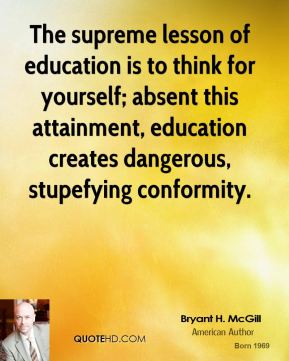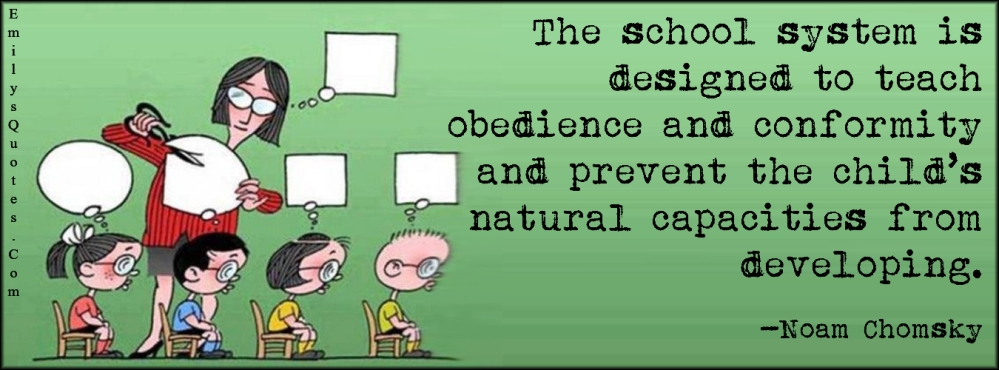If children grew up according to early indications, we should have nothing but geniuses.
Johann Wolfgang von Goethe
RSA Animate – Changing Education Paradigms
https://www.youtube.com/watch?v=zDZFcDGpL4U
https://www.youtube.com/watch?v=R2RWgVRfaSE&feature=iv&src_vid=ldkAuUgSjdQ&annotation_id=annotation_925736
The Untold Historical Truth Of American Education – Charlotte Iserby
https://www.youtube.com/watch?v=2Pcby7HgSfY
Mind Control in Public Schools with Charlotte Iserbyt
Download Charlotte Iserby’s book: The Deliberate Dumbing Down of America – A Chronological Paper Trail: – Click here DDDoA.sml-1
Bertrand Russell and Education Policy

Bertrand Russell, one of the top intellectuals of his day, wrote in his book entitled The Impact of Science on Society (1952) :
“It is to be expected that advances in physiology and psychology will give governments much more control over individual mentality than they now have even in totalitarian countries. Fichte laid it down that, education should aim at destroying free will, so that, after pupils have left school, they shall be incapable, throughout the rest of their lives, of thinking or acting otherwise than as their schoolmasters would have wished. But in his day this was an unattainable ideal: what he regarded as the best system in existence produced Karl Marx. In future such failures are not likely to occur where there is dictatorship. Diet, injections, and injunctions will combine, from a very early age, to produce the sort of character and the sort of beliefs that the authorities consider desirable, and any serious criticism of the powers that be will become psychologically impossible.
Even if all are miserable, all will believe themselves happy, because the government will tell them that they are so.”
(Ring any bells? Note ‘The Impact of Science’ and educational mind control to poison us all into submission and docile stupidity. He wants science to use a chemical cosh to beat us all into docile submission to authority)
He continues: “A population who can read and write is more efficient than one that cannot” (Social 118). This concludes that the production level of a state which is educated will be higher than a state whose people are not. The system of distribution and the means in which wealth is dispersed to the people will have an immense impact upon the education of a state (Social 119). “The system of distribution determines the division of the community into classes, and wherever there are classes, different classes will receive different kinds of education” (Social 119). Those who have a higher education will often place their children in higher education, while those who do not, cannot afford to place their children in higher education. Thus, the division in the community is continuous… “the whole educational problem, where women are concerned, has been distorted by the desire for sex equality; there has been an attempt to acquire the same education as that given to boys, even where it was by no means good” (Good 19). http://www.newfoundations.com/GALLERY/Russell.html
For the author of this blog it’s like reading my own early education history, this is exactly what happened during my education. I don’t seem to have any memory of being taught to read, even though my recall of early childhood is quite good. I do, however remember joining a library at a very early age, reading by skipping the hard words I didn’t understand and reading the ones I recognised. Reading became a habit that has never left me; for most of my life I read just about everything I could get my hands on. I consider my school education to have been an utter waste of time and effort, complete boredom and were it not for books I would have become as ignorant as Fichte and Russell wanted me to be. I was taught how to endure boredom an ideal skill for someone who is about to become factory fodder – which is exactly what happened.
I hear the sceptics murmuring that ‘it’s different today’, but it’s not different, how would you know if there is no other education system to compare? Victorian education is still with us in Britain and the US because it suits the financial status quo. The majority of us are still trained as Victorian factory fodder. Dumbed-down by a lying, brainwashing education system that tells us we are unworthy compared to the great minds that went before us; compelled to complete it in order to get a job. It’s not always the teachers fault as they were victims of exactly the same system. Does this also apply to scientific education? Well yes, of course, they are as dumb as the rest of us but they are only permitted to read books chosen for scientists – peer reviewed. This is why we have scientific sceptics, because they only read about the 5% of the universe that scientists say they can observe and this leaves them blind and dumb; but feeling absolutely brilliant.
Education is about learning facts, not about learning. Facts are only good for passing exams and TV quiz programs.
Stop learning start thinking | Jacob Barnett | TEDxTeen
One thing I recall from early yeas was the once a year reading test. A lady from the education authority would take us individually into a quiet room where we would read from a long narrow, laminated card. “Read from the card and see how far you can get” she said, and so I did. My reading was interrupted by her screaming, “Stop, Stop”. I had read too far down the card for my own good.
Dumbing Us Down
John Taylor Gatto “Dumbing Us Down: the Hidden Curriculum of Compulsory Schooling”
“The Underground History of American Education: A Schoolteacher’s Intimate Investigation Into the Problem of Modern Schooling”.
What does the school do to children?
Gatto states the following assertions in “Dumbing Us Down”:
1.It confuses the students. It presents an incoherent ensemble of information that the child needs to memorize to stay in school. Apart from the tests and trials that programming is similar to the television, it fills almost all the “free” time of children. One sees and hears something, only to forget it again.
2.It teaches them to accept their class affiliation. (inferiority)
3.It makes them indifferent. (to give up)
4.It makes them emotionally dependent. (on a set of fixed rules)
5.It makes them intellectually dependent. (on scientists)
6.It teaches them a kind of self-confidence that requires constant confirmation by experts (provisional self-esteem). (peer review?)
7.It makes it clear to them that they cannot hide, because they are always supervised.”(acceptance of surveillance)
http://en.wikipedia.org/wiki/John_Taylor_Gatto#Main_thesis
http://en.wikipedia.org/wiki/Dumbing_down
Gatto says: “Good students wait for a teacher to tell them what to do. This is the most important lesson of them all: we must wait for other people, better trained than ourselves, to make the meanings of our lives. The expert makes all the important choices; only I, the teacher, can determine what my kids must study, or rather, only the people who pay me can make those decisions, which I then enforce.”― John Taylor Gatto, Dumbing Us Down: The Hidden Curriculum of Compulsory Schooling https://www.goodreads.com/work/quotes/516764-dumbing-us-down-the-hidden-curriculum-of-compulsory-schooling

Ray Bradbury:
“Cram them full of non-combustible data, chock them so damned full of ‘facts’ they feel stuffed, but absolutely ‘brilliant’ with information. Then they’ll feel they’re thinking, they’ll get a sense of motion without moving. And they’ll be happy, because facts of that sort don’t change. Don’t give them any slippery stuff like philosophy or sociology to tie things up with. That way lies melancholy.”– Ray Bradbury, Fahrenheit 451
Thanks to informationclearinghouse.info who say: The Educational System Was Designed to Keep Us Uneducated and Docile:
“The Rockefeller Education Board—which funded numerous public schools, issued a statement which read in part: In our dreams…people yield themselves with perfect docility to our moulding hands. The present educational conventions [intellectual and character education] fade from our minds, and unhampered by tradition we work our own good will upon a grateful and responsive folk. We shall not try to make these people or any of their children into philosophers or men of learning or men of science. We have not to raise up from among them authors, educators, poets or men of letters. We shall not search for embryo great artists, painters, musicians, nor lawyers, doctors, preachers, politicians, statesmen, of whom we have ample supply. The task we set before ourselves is very simple…we will organize children…and teach them to do in a perfect way the things their fathers and mothers are doing in an imperfect way.
At the same time, William Torrey Harris, US Commissioner of Education from 1889 to 1906, wrote: Ninety-nine [students] out of a hundred are automata, careful to walk in prescribed paths, careful to follow the prescribed custom. This is not an accident but the result of substantial education, which, scientifically defined, is the subsumption of the individual.
In that same book, The Philosophy of Education, Harris also revealed: The great purpose of school can be realized better in dark, airless, ugly places…. It is to master the physical self, to transcend the beauty of nature. School should develop the power to withdraw from the external world.
Several years later, President Woodrow Wilson would echo these sentiments in a speech to businessmen: We want one class to have a liberal education. We want another class, a very much larger class of necessity, to forego the privilege of a liberal education and fit themselves to perform specific difficult manual tasks.
Writes John Taylor Gatto: “Another major architect of standardized testing, H.H. Goddard, said in his book Human Efficiency (1920) that government schooling was about ‘the perfect organization of the hive.'”” http://www.informationclearinghouse.info/article11693.htm
Contrary to popular mythology, the highly educated are less likely to think of new ideas than the uneducated. The educated are so full of the ideas of others that they find it difficult, often impossible to conceive of anything new. Hence the decline of useful ideas from science at a time when we have more scientists than at any other time since history began.
Do we, or our children need this kind of education thrust upon us by the state? I don’t think so. At age seven, the basic requirements to enable them to understand their place in society could be taught within a few months:
Reading: the most basic learning necessity: all other subjects can be learned from reading, without the need for guidance from experts. The kids can choose who to believe.
Writing: the need to communicate is important and so this needs to be taught.
Arithmetic: A basic teaching in money and measurement is all that is required. Otherwise math’ is not essential as it can be learned from reading if required. Ironically, these are often the very things that education fails to teach successfully.
 Thinking about education reminds me of the guy on TV who took a course of tango lessons. Having completed the course he was told to forget all he had been taught and get on the floor and just dance. This is a wonderful guide for those completing any kind of education.
Thinking about education reminds me of the guy on TV who took a course of tango lessons. Having completed the course he was told to forget all he had been taught and get on the floor and just dance. This is a wonderful guide for those completing any kind of education.
But I hear the complaint from educators that chaos would ensue, and the answer to this is yes and no. Yes there would be chaos in a system that teaches that there is only one way to do things and discourages new ideas. But it certainly would not be chaotic in a system that encourages new ideas and change for the better. Start a revolution, tango your way to a better education by thinking for yourself.
